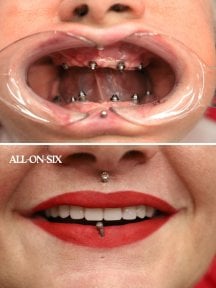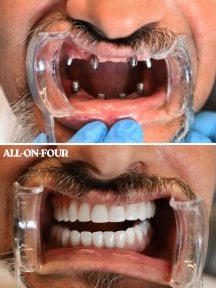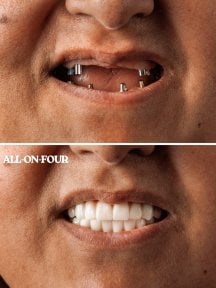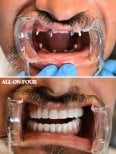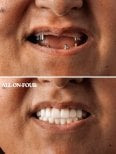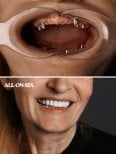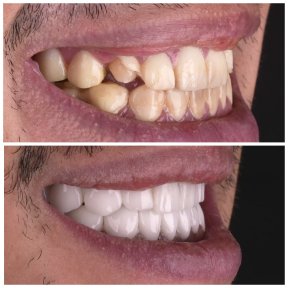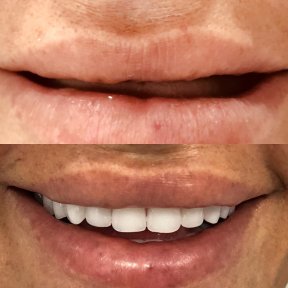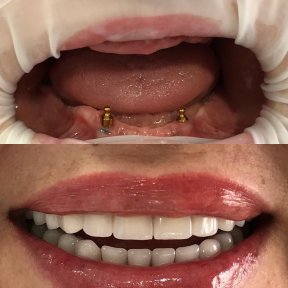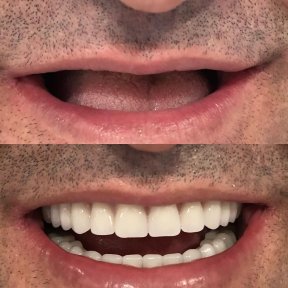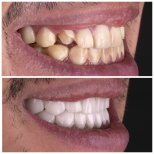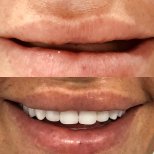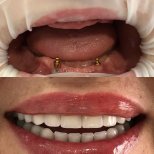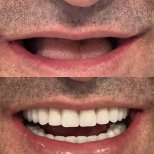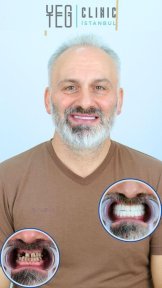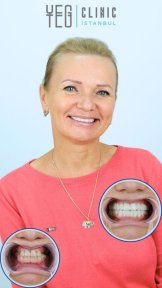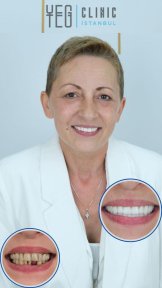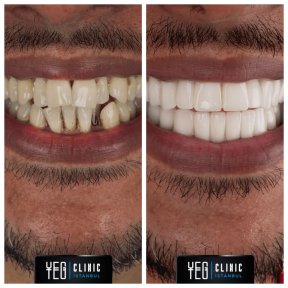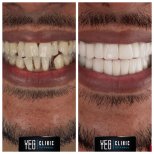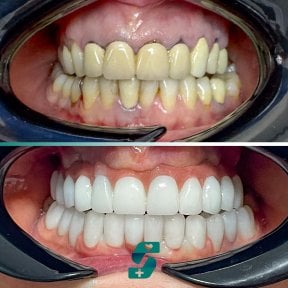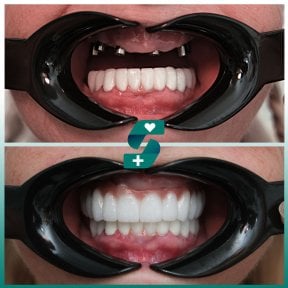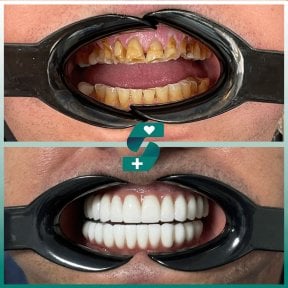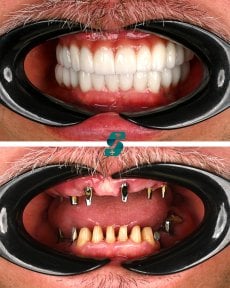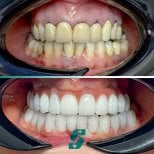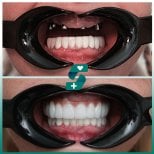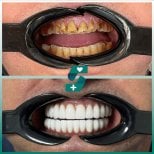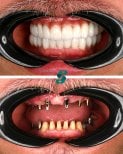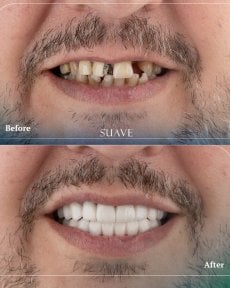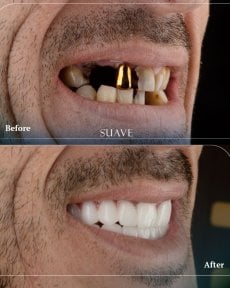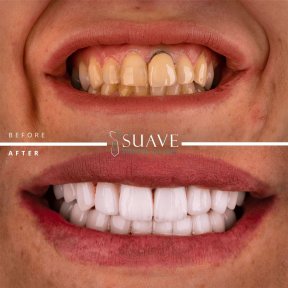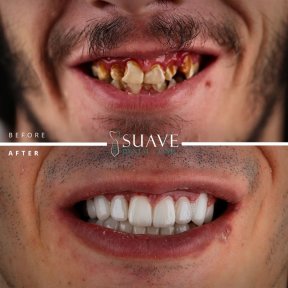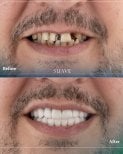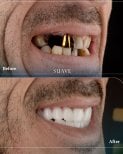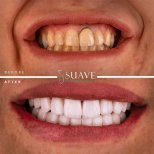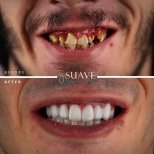As a Straumann Dental Implant System Official Provider, WestDent Clinic offers Straumann or Nobel Biocare options for single-tooth replacement. Dr. Hasan Onur Akin, an ITI-certified periodontology specialist, performs the two-visit protocol. The package costs around $350, covering the implant and zirconia crown placement, 9 nights in a 4-star hotel, and VIP airport transfers. This Izmir clinic serves over 45,000 patients annually with digital implant planning and online consultations available.
Cheapest Implants in the World: What Are Dental Implants?
Dental implants are artificial tooth roots made of titanium, surgically placed in the jawbone to support replacement teeth. They provide a permanent solution for missing teeth, restoring both function and appearance.
Unlike traditional dentures, these titanium posts fuse with the bone through a process called osseointegration, resulting in a secure, natural-looking result. This tooth replacement option has become increasingly popular for people who have lost one or more teeth due to injury, decay, or other oral health issues.
According to the American Dental Association, 5 million implants are placed annually in the US, demonstrating the widespread acceptance of this treatment.
Key benefits:
-
Long-lasting solution (15+ years with proper care).
-
Preserves jawbone and prevents bone loss.
-
Feels and functions like natural teeth.
-
Eliminates discomfort of removable dentures.
What Does a Dental Implant Look Like?
The implant system consists of three essential components:
- the screw (titanium post) anchored in the jawbone;
- the abutment connecting the post to the replacement tooth;
- and the crown, the visible tooth-like part of the restoration.
A study on mouth implants showed significant benefits for patients. Out of 214 individuals with missing teeth, 30.4% chose this treatment option, citing improvements in chewing, oral health, aesthetics, and durability as key reasons. Overall, tooth replacement with titanium posts significantly enhances quality of life.
Options for Dental Implants in Turkey
Turkey offers various implant options through 424 specialized clinics to suit different patient needs and clinical situations. From traditional methods to advanced solutions for bone loss, there's an approach for every case.
Traditional implants
The standard method consists of 2 stages: implant placement followed by a healing period (3–6 months) before placing the crown.
✔️ Suitable for most patients with sufficient bone structure.
A 2021 study of traditional implant procedures found a 94% survival rate at 15 years, with minimal bone loss (0.49 mm at 8–10 years). However, risk factors like smoking and diabetes can increase the chances of failure.
All-on-4 and all-on-6 techniques
For full mouth restoration, these techniques use 4 or 6 strategically placed posts per jaw to support a full set of teeth. These methods provide faster recovery and are more cost-effective than individual tooth replacements.
✔️ They're ideal for patients with some bone loss who want comprehensive restoration.
A longitudinal study of 245 patients with All-on-4 implants showed patient-related success rates of 94.8% at 5 years and 93.8% at 10 years, with prostheses survival at 99.2%.
Immediate load implants
This advanced technique allows placement and teeth attachment in one visit. No need for bone grafting or sinus lifting in most cases.
✔️ Suitable for patients with adequate bone density who want immediate results.
A systematic review reported a 98.4% survival rate for immediate placement in fresh extraction sockets after 2 years.
Comparison With Other Procedures
Titanium tooth roots offer superior stability and preservation of natural oral structures compared to alternative treatments.
Implants vs. bridges
-
Bridges. Require filing down adjacent teeth for support.
-
Titanium posts. Preserve natural teeth and prevent bone loss.
A 10-year review found implants had a 95% survival rate with less bone loss than bridges, which led to 15–20% bone loss in 5 years. The implant approach also preserved natural teeth and supported jawbone health.
Implants vs. dentures
-
Dentures. Can slip, cause discomfort, and require adhesives.
-
Titanium tooth roots. Fixed, stable, and offer better chewing efficiency.
Who Is a Candidate for Dental Implants?
This tooth replacement method works well for many patients, but bone density and overall health are key determining factors.
Suitable for patients who:
-
Have one or more missing teeth.
-
Have good general health and healthy gums.
-
Have adequate jawbone density (or are open to bone grafting if necessary).
Not recommended for:
-
Patients with severe bone loss (unless opting for specialized techniques).
-
Those with uncontrolled diabetes or gum disease.
-
Heavy smokers (increased risk of treatment failure).
How Is the Surgery Performed?
1. Consultation & planning
-
3D CT scans & digital impressions.
-
Choose the implant type (Straumann, Nobel Biocare, etc.).
2. Surgical Procedure
-
Step 1: A titanium post is placed in the jawbone under local or general anesthesia.
-
Step 2: Healing period (osseointegration) of 3–6 months.
-
Step 3: Permanent crown placement.
Osseointegration is the critical biological process where the titanium implant fuses with surrounding jawbone tissue. This process typically takes 3–6 months, though advanced surface technologies like Straumann's SLActive can accelerate integration to just a few weeks. During the initial 1–2 weeks, soft tissue healing occurs with mild swelling and discomfort peaking within 24–48 hours. The implant then undergoes osseointegration where bone cells grow around and integrate with the titanium surface, creating a permanent, stable foundation.
| Missing tooth treatment steps | Description | Duration |
|---|---|---|
| Initial consultation | Examination, imaging (panoramic X-rays, 3D C.T. scans), and treatment planning. | 1 visit |
| Preparation | Pre-treatment instructions, possible bone grafting if needed. | 1–2 visits |
| Implant installation | Surgery to insert the titanium posts into the jawbone. | 1 visit |
| Healing period | Osseointegration process where implants fuse with the jawbone. | 3–6 months |
| Abutment placement | Minor surgery to attach the abutments to the posts. | 1 visit |
| Crown placement | Taking impressions and attaching the custom crowns. | 1–2 visits |
Permanent teeth can be fixed within a few days with immediate load techniques.
Recovery and Rehabilitation
Recovery after implant surgery is gradual, but following proper post-operative care ensures smooth healing.
Dental implant recovery occurs in three distinct phases: initial healing (1–2 weeks) where patients experience mild swelling and discomfort that peaks within 24–48 hours, osseointegration where the titanium implant fuses with jawbone, and final restoration placement. Most patients are fully recovered from initial surgery within 2 weeks, though the implant continues bonding with bone for 3–6 months.
-
Initial swelling and minor discomfort for a few days.
-
Soft food diet for 2 weeks.
-
No smoking & no alcohol to ensure proper healing.
-
Full recovery: 3 to 6 months (osseointegration).
-
Follow-up visits for adjustments & check-ups.
Is It Safe to Have Dental Implants in Turkey?
This surgical procedure is generally safe and successful, but like any medical treatment, it comes with some risks.
Clinical studies show that 96.4% of patients experience successful outcomes without major complications. Infection rates range from 4–10% of patients, with rates varying by age group. Patients aged 20–40 have the highest infection rate at 20.7%, which decreases progressively with age. Early implant failures occur approximately twice as often as late failures, with most complications arising within the first year.
Common side effects:
-
Mild pain, swelling, and bruising (subsides in a few days).
Rare complications:
-
Infection at the surgical site.
-
Nerve damage (rare but possible).
-
Treatment failure (if the bone doesn't integrate properly).
How to avoid issues:
-
Choose experienced surgeons such as Dr. Susana Akdash (WestDent Clinic), Dr. Goksel Kalyaz (Soraca Med), and Dr. Hasan Onur Akin (WestDent Clinic) who specialize in implantology and aesthetic dentistry.
-
Follow post-op care guidelines.
-
Maintain good oral hygiene.
Implant Brands Used in Turkey
Turkish dentists use several reputable, high-quality brands recognized globally for their reliability and success rates. Leading facilities such as Soraca Med (4.9/5, Antalya), WestDent Clinic (4.8/5, İzmir), and DENTAGLOBAL Dental Clinic (4.8/5, İzmir) utilize premium implant systems with verified success rates.
Overview of popular brands:
-
Nobel Biocare (Sweden)
-
Straumann (Switzerland)
-
Zimmer Biomet (USA)
-
BioHorizons (USA)
Why these brands?
-
Advanced technology;
-
High success rates;
-
Biocompatibility.
Brand-specific success rates
Different implant brands show varying success rates based on clinical studies.
- Straumann implants demonstrate survival rates of 99.3% at 3 years, 99.0% at 5 years, and 98.4% at 7 years according to a retrospective study of 4,591 implants.
- Nobel Biocare implants show comparable success rates exceeding 95% after 10 years, with their TiUnite surface technology enhancing osseointegration.
- BioHorizons reports success rates of around 96–98%.
Results: When to Expect the Effect?
According to a 2025 long-term follow-up study, single dental implants show a 95.6% cumulative survival rate after 38–40 years, though crown replacement may be necessary as crown survival was 60.9%.
| Stage | Timeframe | Details |
|---|---|---|
| Initial results | Within a few days | Temporary teeth for immediate load procedures. |
| Final result | 3–6 months | Permanent crowns are placed. |
| Longevity | 15–25 years or more | Treatment can last decades with proper care. |
Why Choose a Dental Clinic in Turkey?
Turkey has become a leading destination for tooth replacement procedures abroad, offering affordable, high-quality treatment with experienced specialists.
Turkey welcomed 2 million health tourists in 2024, generating $10 billion in revenue with dental services representing 15% of all medical tourism procedures.
- Lower prices – Save 60–70% compared to US/UK prices, with Turkey implants costing $518–850 per tooth versus $3,200–5,800 in the US—a savings of $2,650–4,950 per tooth.
- World-Class Clinics – Turkey's 424 dental implant clinics include top-rated facilities such as Soraca Med (4.9/5, Antalya), WestDent Clinic (4.8/5, İzmir), and DENTAGLOBAL Dental Clinic (4.8/5, İzmir). Many hold JCI accreditation and use advanced 3D CT scans & Swiss I-metric 4D scanning.
- Experienced dentists – Specialists such as Dr. Susana Akdash (cosmetic dentistry, implantology), Dr. Goksel Kalyaz (aesthetic and maxillofacial dentistry), and Dr. Hasan Onur Akin (periodontology, dental implants) are trained by ICOI and American Dental Association, ensuring high-quality treatment outcomes.
- All-Inclusive packages – Typical packages include consultation, surgery, hotel stay, and VIP transfers.
- Fast treatment & recovery – Get immediate-load procedures without bone grafting for faster results.
- Proven safety – Patient reviews show high success rates, making it a safe and trusted option.
Turkey's reputation for excellence is reflected in patient experiences. A patient from Ukraine who received treatment at Soraca Med shared: "We had a crown and a filling done promptly at the clinic." (Bookimed verified review, 5.0/5 rating)
A patient from the United States who received treatment at DENTAGLOBAL Dental Clinic shared: "Bookimed was so helpful and extremely nice. Even with the language barrier, there were tons of laughs, smiles and hugs. It was an experience my husband and I will never forget!" (Bookimed verified review, 5.0/5 rating)
What to Do Before Traveling to Turkey?
Before getting teeth treatment in Turkey, patients should prepare for several important aspects of their medical journey.
Visa requirements
Many nationalities can get an e-visa online within minutes. Check eligibility before booking.
Duration of stay
Traditional procedures: 5–7 days (first visit) + 3–6 months for the second visit.
All-on-4 / All-on-6: 5–7 days, as the fixed prosthesis is placed immediately after surgery.
Immediate load procedures: 7–9 days for complete treatment.
Payment & currency
Turkish Lira (TRY), but USD, EUR, and GBP are widely accepted. Cash payments may offer discounts.
Other considerations
-
Choose a 4–5 star hotel near the clinic for comfortable recovery.
-
Bring soft food & pain relievers for post-op care.
-
Avoid strenuous activities for 4–6 weeks.
How Much Do Dental Implants Cost in Turkey?
Turkey offers some of the most affordable tooth replacement options worldwide, with savings of up to 70% compared to the US and UK.
So, what is the average cost in Turkey?
Treatment abroad offers significant savings, with procedures in Turkey costing as low as $518–850. Full mouth restoration can reach up to $30,000. On the other hand, treatment costs in the US and UK range from $3,200 to $50,000.
-
Single procedures: Costs are 3–5 times lower than in Western countries, saving $2,650–$4,950 per tooth.
-
All-on-4: 2–3 times cheaper, saving $12,000–$35,000.
-
All-on-6: 2–3 times cheaper, saving $15,000–$30,000.
-
Full mouth restoration: Potential savings of $15,000–$50,000 depending on the brand and materials.
Factors affecting price
-
Brand of posts (Straumann, Nobel Biocare, Medentika, Bego, etc.).
-
Number of procedures required.
-
Additional procedures (bone grafting, sinus lift).
-
Package deals (accommodation, transfers, aftercare).
With Bookimed, prices are direct from the clinic, with no hidden fees. Payments are made directly to the clinic according to official price lists.
What's Included in a Turkish Package?
Bookimed's partner clinics in Turkey offer comprehensive packages at great prices, covering full mouth restoration and extra perks for international patients.
| Included in most offers in Turkey | Seldom included |
| Titanium post placement | Botox injections |
| All-on-4/All-on-6 procedures | Chest X-ray |
| Consultation with a dentist | Tooth whitening |
| Panoramic X-ray | Clarity/ceramic braces |
| Tooth extraction | Hollywood Smile |
| Post with abutment | Annual check-up |
| Follow-up examination | Jaw shaping |
| 3–5 days in a hotel | VIP hotel accommodation |
| Transfer airport-hotel-clinic-airport | VIP transfer |
| 24/7 Bookimed assistance | Separate payments for multi-visit packages |
| Personal medical coordinator | Annual check-up |
| Patient advocacy | |
| Booking of air tickets and hotel rooms | |
| Standard brands (e.g., Straumann) | |
| Lifetime guarantee on posts |
What should you confirm?
-
Which brand is used? (Straumann, Nobel, etc.)
-
Are extractions & bone grafting included?
-
Is there a warranty on posts and crowns?
-
What type of temporary teeth will be provided?
References
- French, D., Ofec, R., & Levin, L. (2021). Long term clinical performance of 10 871 dental implants with up to 22 years of follow‐up: A cohort study in 4247 patients. Clinical Implant Dentistry and Related Research, 23(3), 289–297. https://doi.org/10.1111/cid.12994
- Maló, P., Araújo Nobre, M., Lopes, A., Ferro, A., & Botto, J. (2019). The All‐on‐4 treatment concept for the rehabilitation of the completely edentulous mandible: A longitudinal study with 10 to 18 years of follow‐up. Clinical Implant Dentistry and Related Research. https://doi.org/10.1111/cid.12769
- Felice P, Pistilli R, Barausse C, Trullenque-Eriksson A, Esposito M. Immediate non-occlusal loading of immediate post-extractive versus delayed placement of single implants in preserved sockets of the anterior maxilla: 1-year post-loading outcome of a randomised controlled trial. Eur J Oral Implantol. 2015 Winter;8(4):361-72. PMID: 26669546
- Kondo, Y., Sakai, K., Minakuchi, H., Horimai, T., Kuboki, T., Atsuta, I., Hasuike, A., Takaoka, K., Tanabe, N., Yamauchi, K., Aita, H., Akiyama, K., Furuya, J., Hiroyasu, K., Oshima, M., Sato, Y., Sawase, T., Yamada, Y., Ayukawa, Y., Hosokawa, R. (2024). Implant-supported fixed prostheses with cantilever: a systematic review and meta-analysis. International Journal of Implant Dentistry, 10(1). https://doi.org/10.1186/s40729-024-00573-8
- Bhagawati, S. B., Jain, S. R., Debnath, P., Riyaz, K., Patil, R., & Ansari, J. (2024). Patients' Perceptions Regarding Acceptance of Dental Implants as an Option for the Replacement of Missing Teeth: An Observational Study. Cureus.https://doi.org/10.7759/cureus.57232
